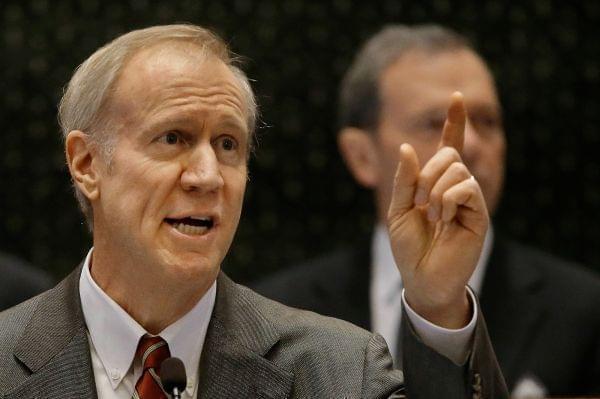Reaction To Rauner Budget Sets Stage For Negotations

Rauner called for deep spending cuts to Medicaid, pensions and other programs to fix the state’s budget mess without raising taxes. (AP Photo/Seth Perlman)
Thirty-eight days into his term as Illinois' governor, Bruce Rauner delivered his much-anticipated budget address on Wednesday. Illinois law requires the governor to submit a spending plan on the third Wednesday in February. So it was happenstance that Gov. Rauner's first time fell on his birthday. Past legislatures had left him quite a birthday gift: A gaping budget hole. The Republican took lawmakers to task for it.
"Now is the time to start on a responsible path after years of financial recklessness," said Rauner.
Then he acknowledged his ideas for fixing things won't be easy to swallow.
"Instilling discipline is not easy. Sayin' no is not popular. But it is now or never for Illinois. It is make or break time."
And with that, Rauner laid out a wide-ranging array of cuts. Six point seven billion dollars' worth. A few areas were spared, like college tuition grants for low income students. And education from kindergarten through high school would see an increase. But otherwise: pick an area, and it's likely to be on the chopping block.
Rauner proposes eliminating programs for homeless youth and patients with AIDS, reducing funding for home care for seniors, and cutting off services, like mental health services for wards of the state the moment they turn 18. The list of cuts goes on. And on.
Democratic State Senator Donne Trotter, said the budget cuts were anything but compassionate.
"A slash and burn budget, which he has effectively and efficiently done, as if he is a ISIS warrior fighting a battle, not against the state of Illinois. But against the people of Illinois," said Trotter.
The new governor's cuts also slash state funding for Amtrak and mass transit systems, universities, and Medicaid. The backlash from advocates and most Democrats was quick and often loud. Critics say cuts to preventative healthcare will land patients in the E.R., and end up costing the state more. And the higher education reductions will lead to tuition hikes, at a time when college is already increasingly unaffordable. Republican Senate GOP Leader Christine Radogno, downplayed those possibilities.
"That's going to be the narrative coming from Democrats, that people are going to be dramatically hurt. But you have to look at how things have changed around us. Obamacare is in place now - there's access to medical service that perhaps wasn't there before. We have created a lot of duplication in 14 years. I think before we jump to that conclusion, we need to evaluate what we have and not jump to the conclusion it's Draconian," said Radogno.
But the legislature's other, Democratic leaders -- who, notably, control super-majorities in both the Illinois House and Senate -- had more critiques of Rauner's plan. The governor wants to cut in half local government's share of the income tax. Rauner says many municipalities can handle it, because they've built up reserves. But he also wants to freeze how much local governments can charge for property taxes. Senate President John Cullerton says that combination isn't feasible.
"The impoverished communities that need the money, I think are going to be entitled to it - or there's going to be property tax increases or first responders being laid off. That's not a good idea,” said Cullerton.
Cullerton also says Rauner's budget creates another gaping hole. It relies on $2 billion dollars in savings from a new pension plan. Rauner proposes leaving retired state employees' and teachers' pensions untouched but current workers would begin earning less generous benefits come summer. The governor says it's better than the current pension overhaul which is before the state Supreme Court.
Even if Rauner's version was to make it through the General Assembly -- and that's a rough road -- it would also surely face a legal challenge too. President Cullerton says it's irresponsible for Rauner to count on his plan leading to savings right away, because there's no way they'll be there. House Speaker Michael Madigan called it "reckless." Madigan has another big disagreement with Rauner.
"The governor has said that he feels that he can eliminate the deficits just by cutting state services. I disagree. I think that the elimination of the deficits will require a blend --- service cuts. Plus new revenue,” said Madigan.
The Speaker offered a specific suggestion: he says Illinois should begin taxing millionaires' income at a higher rate. While Rauner did not discuss any new taxes during his budget address, he did leave the door open.
"Before revenue can be discussed, reform is essential. Before we ask the people of Illinois to pay more to fund state government, we must ensure taxpayers are getting value for their money," said Rauner.
The changes Rauner wants -- overhauling workers' compensation, weakening public employee unions, term limits for legislators -- are also controversial. Now that Rauner has laid out his agenda of "difficult choices," it's the legislature's turn. Look for a rough ride. A key member of Rauner's budget team says he's optimistic lawmakers and the governor will reach an "amicable resolution" by an end of May deadline.
Then he added, "We'll see if that works out."
